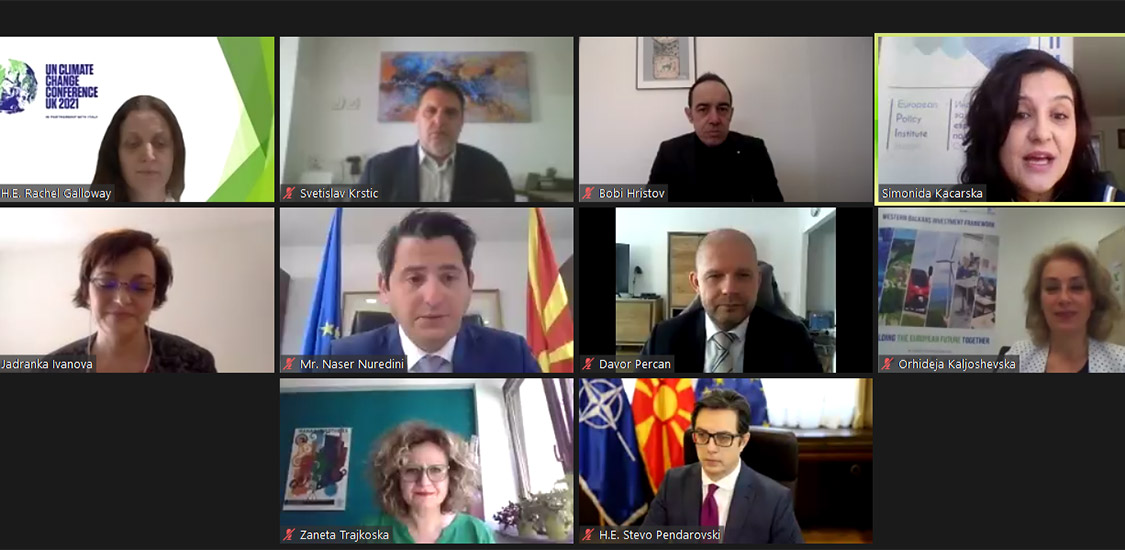
Water should be protected from a more far-reaching and long-term perspective, so we don’t lose it
An investment of approximately 1.7 billion euros is needed to treat urban wastewater, which is now discharged directly into rivers, lakes and soils. Water is a resource that is consumed indefinitely, and for years the competent institutions have not had a real insight into the quality and quantity of waters in North Macedonia.
These are some of the topics discussed at the virtual conference “Green Agenda for the Western Balkans as an incentive for water protection in North Macedonia”, organized by the Institute for European Policy in cooperation with the Institute of Communication Studies, as part of the “Clear it Up” campaign.
In the opening of the conference, the director of the Institute for European Policy, Simonida Kacarska emphasized that the environment is one of the areas of the EU accession process in which no greater progress can be noticed and stressed that the aim of the conference is to create a space that links national and EU policies in this area.
The director of the Institute of Communication Studies, Zaneta Trajkoska said that only with open data and transparent institutions we can have high-quality environmental policies. “`Clear it Up` as an alliance will seek to be involved in advancing water protection laws, mineral resources and inspections,” Trajkoska said.
“Our country is located in one of the most climate-vulnerable regions in the world. If we do not take measures to protect water resources, we can very easily lose them irreversibly. Water protection is not only an internal economic and environmental issue, but also a European issue. Let us protect our water resources with a more long-term perspective, so that we do not lose them irretrievably,” said President Stevo Pendarovski in his welcoming address to the conference.
British Ambassador Rachel Galloway said that the current monitoring of water quality and quantity is unsuitable to give a realistic picture of the current state of water resources.
“There is no systemic and continuous monitoring and assessment, and the authorities cannot obtain adequate water management data. The lack of accurate data on the status of water bodies means that the viability, sustainability, rationality and efficacy of policies and administrative measures on water use and protection is brought into question”, Galloway said at the start of the conference.
According to the data, only about 3-4 percent of the total amount of wastewater is treated in North Macedonia. The Minister of Environment and Physical Planning Naser Nuredini also addressed this problem.
“We are investing in the largest wastewater treatment plant in Skopje and have started projects for Bitola, Kicevo and Tetovo. We are committed to having clean drinking water for our citizens. We call on you to work with us, to create awareness for solving these problems”, Minister Nuredini said.
Svetislav Krstic, a professor at the Institute of Biology, said that although the waters were the state’s bloodstream, they are being poisoned with hazardous substances. “Some seem to think that what is released into the rivers simply goes away, but that is not true. Our river systems, for the most part, are registered as ‘dead’ ecosystems,” Professor Krstic said.
According to Jadranka Ivanova, a longtime expert in the field of water resources, to meet EU standards, 1.7 billion euros are needed for urban water treatment and 87 treatment plants, and EU directives should be met by 2041. Orhideja Kaljoshevska from the Investment Framework for the Western Balkans said that the interventions in the treatment plants are the most expensive investments that cannot be covered by only one donor or financed solely through the state budget and that environmental projects can be implemented through the IPA cross-border cooperation. Therefore, according to Davor Percan from the European Commission’s Directorate-General for Environment, it is very important that water resources targets be integrated into other EU policies related to climate change, energy and agriculture in particular.
The “Clear it Up” campaign is implemented by the Institute of Communication Studies and is supported by the British Embassy in Skopje.

